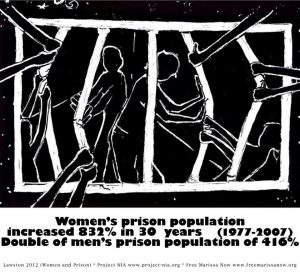Since Nixon’s formal declaration of ‘drugs‘ as Public Enemy #1 in 1971, women have been the fastest growing U.S prison population. The number of women behind bars has skyrocketed more than 600% since Nixon’s formal declaration. While Nixon introduced harsh sentencing laws, he is the only president in U.S history to have dedicated more funding towards treatment than to law enforcement . Reagan initiated an explicitly more militant approach by disseminating a rabid, intolerant, and stigmatizing public relations campaign disseminating a “tough on crime” approach to the War on Drugs. It was during this time that the U.S’s draconian sentencing regime began to grow teeth and have a disparate impact on women.

In Neutralizing the Gendered Collateral Consequences of the War on Drugs, Marne L. Lenox, J.D. joins a cohort of scholars who scrutinize the ‘gender-neutral’ contours of the U.S legal system which further oppress justice-involved women and systematically obstruct their ability to fully access their human rights and participate in society after their release–collateral consequences. Lenox highlights that ‘collateral consequences specifically target drug offenses, drug felons, and misdemeanants who suffer more severe post-prison sanctions than do any other class of offenders with the exception of sex offenders’ and that ‘as a result of draconian sentencing practices… non-violent drug offenders serve sentences similar to those convicted of murder and kidnapping and spend more time incarcerated than those convicted of rape, manslaughter, and assault.”

Between 1986 and 1996, the number of women incarcerated for drug offenses in state prison rose 888%. Many of those women were/are primary caretakers serving sentences for first-time non-violent drug offenses. However, despite the ‘disproportionate impact of [this War] on women, the Personal Responsibility and Work Opportunity Act of 1996 (PRWORA), which gave birth to Temporary Assistance for Needy Families (TANF), “established a lifetime ban on cash and food assistance for individuals with felony drug convictions,” effectively incapacitating a primary caretaker’s ability to care for not only themselves but their children as well. Thus, collateral consequences are an inter-generational concern because they reach much farther than just their direct impact on justice-involved women; the livelihoods of their children are compromised as well.
It is imperative that policies adopt a gender-sensitive approach to sentencing that acknowledges the magnitude of social barriers placed in front of justice-involved women when they are released. Lenox’s Note sets forth gender-specific proposals for legislative reform that would significantly lower the multi-tiered barriers and social determinants that perpetuate cycles of impoverished families and obstruct justice-involved women’s path towards economic mobility such as, “awarding differential treatment based on one’s primary care-taking status.”
Myrna Raeder, a prominent advocate for gender-equity in the criminal justice system, remarks that “sentencing guidelines cannot be truly ‘gender-neutral’ if they do not recognize the gender-based realities of criminal activity and child-bearing.” This recognition affirms that ‘gender-neutral’ sentencing reflects the ‘reality that patriarchy continues to permeate social institutions,’ is disparately detrimental to justice-involved women, and must be changed.
SCSJ is engaged in work that seeks to mitigate the deleterious impact of collateral consequences on the socio-economic well-being of women and their children.
What are your thoughts on this issue?
Learn more about collateral consequences
Learn the basics about the Drug War
—–
Written by SCSJ Troan Intern Adé Oni
